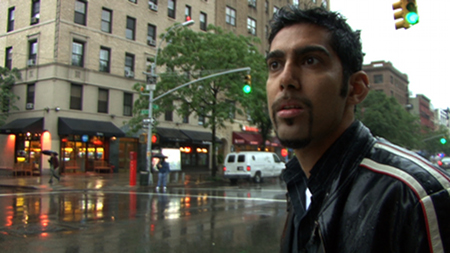

By Kim Voynar Voynar@moviecitynews.com
Sundance Review: When I Walk
I’m not always a big fan self-exploratory, therapeutic docs in which the filmmaker explores some aspect of their lives through cinema, but When I Walk, director Jason DaSilva’s wrenchingly autobiographic journey through the hell of his rapid physical deterioration after a diagnosis of multiple sclerosis is an exception to that rule.
DaSilva was filming a vacation trip with his family in 2006 when he collapsed to the ground and found himself unable to get up again; from that moment on his previous life of traveling the world to make documentary films would never be the same. As part of coming to terms with the new and ever-shifting “normal” that would be the rest of his life, DaSilva followed his instinct, picked up his camera, and turned it on himself. This project could have devolved into the maudlin and self-absorbed; instead DaSilva’s strength and resilience, his determination to stay positive – bolstered in part by his relentlessly positive mother, who’s prone to calling him out on any over-privileged American kid whining and reminding him constantly that we only have one life to live, and have to make the most of it – is what shines through every frame of his story.
When I Walk follows DaSilva through diagnosis and endless medical tests, and cures both Western and otherwise, as he loses his strength and ability to make his body do what he wants it to do. His gait becomes erratic and halting; his coordination gets clumsier and clumsier; he’s forced to use a cane, then a walker, then finally a motorized scooter to get around. He has to deal with the loss of his sense of self, too; the beautiful women who flocked to him when he was healthy are nowhere to be found, and the challenges of continuing to pursue his lifelong dream of filmmaking force him to question whether he can continue to follow that path. In the midst of making a film about himself, he travels with his brother to India to attempt to make a short film, only to have to ultimately abandon that project. Yet still, he perseveres and dreams, fights his disease and seeks a cure, and pushes himself to finish this documentary, at least, no matter how big a mountain that may be to climb.
As DaSilva’s condition deteriorates his body, he’s also forced to come to terms with the inherent challenges of living in New York City as a disabled person. Coffee shops, stores and restaurants that he once would have entered without thinking about it are now closed to him by their lack of disabled access. Cars nearly run over his scooter on the street, irritated drivers blare their horns at the audacity of a man who can no longer walk daring to inconvenience their own traverse, most likely never pausing to consider that they might ever find themselves in a similar situation. Who would ever think that a healthy, energetic young person might suddenly find their world turned upside down? That’s the kind of thing that happens only to others … until, like DaSilva, you find it’s happened to you and your life will never be the same.
But then DaSilva finds that maybe life isn’t completely over, when he meets Alice Cook at an MS support group. Her mother also has MS, so she knows, at least to an extent, what she’s getting into, and DaSilva’s camera unflinchingly charts the course of their relationship through its peaks and valleys, doubts and fears. What will it mean to be in a long-term relationship with a man who ultimately might not be able to move, or even talk? Could they have children one day? And most of all, is she willing to take on the work and responsibility of being the person who’s committing to care for this man she loves, in sickness and in health, for better or worse? Her father seals the deal when she asks him if she should date a person with MS. I am, he said. I’m with your mother. It’s hard to argue with that.
When I Walk overcomes the risk of being gloomy or solipsistic by the sheer force of the personality of its director and subject, and most of all by the bravery and honesty with which both DaSilva and Cook are willing to turn the lens toward themselves, sharing their moments both lovely and sad as they seek to overcome the obstacles and find a way to make life sweet in spite of this unexpected fork in the road that’s made of his life something completely different than he ever thought it would be. It’s a lovely, inspiring film, deeply personal and honest, and it’s a privilege to watch from the wings as DaSilva comes to accept that this, now, is what his life is, and he will find a way to continue to make it an amazing journey.















